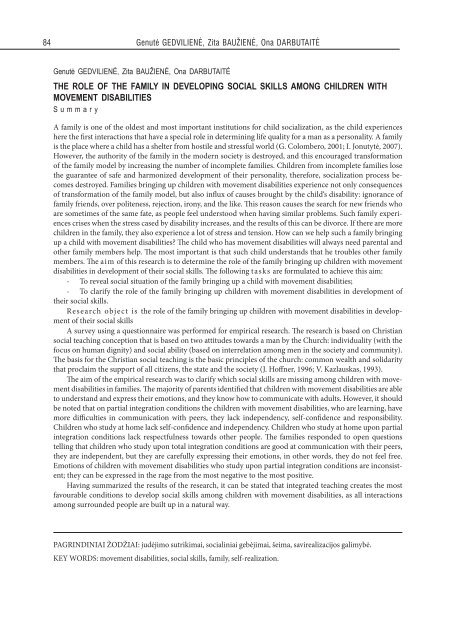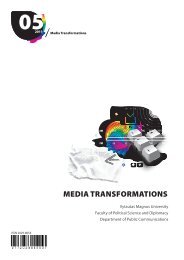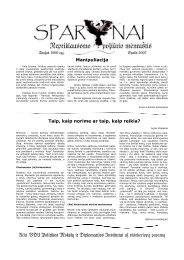Soter Nr. 26 - Vytauto Didžiojo universitetas
Soter Nr. 26 - Vytauto Didžiojo universitetas
Soter Nr. 26 - Vytauto Didžiojo universitetas
You also want an ePaper? Increase the reach of your titles
YUMPU automatically turns print PDFs into web optimized ePapers that Google loves.
84<br />
Genutė GEDVILIENĖ, Zita BAUŽIENĖ, Ona DARBUTAITĖ<br />
Genutė GEDVILIENĖ, Zita BAUŽIENĖ, Ona DARBUTAITĖ<br />
THE ROLE OF THE FAMILY IN DEVELOPING SOCIAL SKILLS AMONG CHILDREN WITH<br />
MOVEMENT DISABILITIES<br />
S u m m a r y<br />
A family is one of the oldest and most important institutions for child socialization, as the child experiences<br />
here the first interactions that have a special role in determining life quality for a man as a personality. A family<br />
is the place where a child has a shelter from hostile and stressful world (G. Colombero, 2001; I. Jonutytė, 2007).<br />
However, the authority of the family in the modern society is destroyed, and this encouraged transformation<br />
of the family model by increasing the number of incomplete families. Children from incomplete families lose<br />
the guarantee of safe and harmonized development of their personality, therefore, socialization process becomes<br />
destroyed. Families bringing up children with movement disabilities experience not only consequences<br />
of transformation of the family model, but also influx of causes brought by the child‘s disability: ignorance of<br />
family friends, over politeness, rejection, irony, and the like. This reason causes the search for new friends who<br />
are sometimes of the same fate, as people feel understood when having similar problems. Such family experiences<br />
crises when the stress cased by disability increases, and the results of this can be divorce. If there are more<br />
children in the family, they also experience a lot of stress and tension. How can we help such a family bringing<br />
up a child with movement disabilities? The child who has movement disabilities will always need parental and<br />
other family members help. The most important is that such child understands that he troubles other family<br />
members. The aim of this research is to determine the role of the family bringing up children with movement<br />
disabilities in development of their social skills. The following tasks are formulated to achieve this aim:<br />
- To reveal social situation of the family bringing up a child with movement disabilities;<br />
- To clarify the role of the family bringing up children with movement disabilities in development of<br />
their social skills.<br />
Research object is the role of the family bringing up children with movement disabilities in development<br />
of their social skills<br />
A survey using a questionnaire was performed for empirical research. The research is based on Christian<br />
social teaching conception that is based on two attitudes towards a man by the Church: individuality (with the<br />
focus on human dignity) and social ability (based on interrelation among men in the society and community).<br />
The basis for the Christian social teaching is the basic principles of the church: common wealth and solidarity<br />
that proclaim the support of all citizens, the state and the society (J. Hoffner, 1996; V. Kazlauskas, 1993).<br />
The aim of the empirical research was to clarify which social skills are missing among children with movement<br />
disabilities in families. The majority of parents identified that children with movement disabilities are able<br />
to understand and express their emotions, and they know how to communicate with adults. However, it should<br />
be noted that on partial integration conditions the children with movement disabilities, who are learning, have<br />
more difficulties in communication with peers, they lack independency, self-confidence and responsibility.<br />
Children who study at home lack self-confidence and independency. Children who study at home upon partial<br />
integration conditions lack respectfulness towards other people. The families responded to open questions<br />
telling that children who study upon total integration conditions are good at communication with their peers,<br />
they are independent, but they are carefully expressing their emotions, in other words, they do not feel free.<br />
Emotions of children with movement disabilities who study upon partial integration conditions are inconsistent;<br />
they can be expressed in the rage from the most negative to the most positive.<br />
Having summarized the results of the research, it can be stated that integrated teaching creates the most<br />
favourable conditions to develop social skills among children with movement disabilities, as all interactions<br />
among surrounded people are built up in a natural way.<br />
PAGRINDINIAI ŽODŽIAI: judėjimo sutrikimai, socialiniai gebėjimai, šeima, savirealizacijos galimybė.<br />
KEY WORDS: movement disabilities, social skills, family, self-realization.





